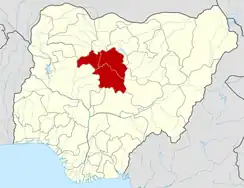Jaba, Nigeria
Jaba is a Local Government Area in southern Kaduna State, Nigeria. It covers an area of 531 km2.[2] It is located close to the Jos Plateau region and Abuja in the central part of Nigeria in West Africa. The local government capital is in the town of Kwoi. The postal code of the area is 801.[3] The Chairman of the local government oversee both economic and developmental activities in the area.[4]

Jaba
Ham | |
|---|---|
| Country | |
| State | Kaduna State |
| Headquarters | Kwain |
| Government | |
| • Sole Administrator | Nita Byack George |
| Area | |
| • Total | 205 sq mi (531 km2) |
| Population (2006) | |
| • Total | 155,973 |
| • Density | 1,027/sq mi (396.7/km2) |
| Time zone | UTC+1 (WAT) |
| ISO 3166 code | NG.KD.JA[1] |
Etymology
It is named after Jaba a local Hausa word used to describe the Ham people who occupy most of the local government. The Ham people describe the word Jaba as derogatory.[5][6]
History
The Local Government was created on the 27th of August 1991.[7] It was carved out from Jema'a Local Government Area.[7] The local government is one of the old place in southern Kaduna, which the Java paramount chiefs since the colonial administration from 1910 till date.[8]
Boundaries
Jaba Local Government Area (LGA) shares boundaries with Kachia LGA to the northwest, Kagarko LGA to the southwest, Zangon Kataf LGA to the north, Jema'a LGA to the east; and Karu LGA of Nasarawa State to south, respectively.[9][10]
Economy
Jaba is known for its unusual agricultural status as one of the world's top producing regions for ginger, with the sale and export of the commodity significantly boosting the local economy. Rams, goats, camels, and donkeys are just a few of the domestic animals that are raised and sold in the LGA. Hunting and trading are two other significant economic activities carried out by the residents of Jaba LGA.[11]
Administrative subdivisions
Jaba Local Government Area consists of 10 subdivisions (second-order administrative divisions) or electoral wards, namely:[7][12]
Demographics
At the 2000 and 2006 census, there were 155,973 people in the local government area and a 2016 projection of 210,500.[7][14] It is inhabited predominantly by Ham people, part of the people likely to have created the Nok culture.[7]
The inhabitants are predominantly Christians.
Infrastructure
Education
There are a few administrative offices/agencies with educational institutions with the only higher institution being ECWA Pastors' Training College in Kwain (Kwoi).
Notable people
- Ishaya Ibrahim, military personnel
- Adamu Maikori, lawyer, banker, politician
- Audu Maikori, lawyer, entrepreneur
- Yahaya Maikori, lawyer, entrepreneur
- Usman Mu'azu, military personnel
- Andrew Jonathan Nok, biochemist
References
- HASC, population, area and Headquarters Statoids
- "Kaduna State of Nigeria". City Population. Retrieved September 26, 2020.
- "Post Offices- with map of LGA". NIPOST. Archived from the original on 2009-10-07. Retrieved 2009-10-20.
- "Jaba Local Government Area". www.finelib.com. Retrieved 2022-05-02.
- Koelle, S. W., Hair, P. E. H., & Dalby, D (1854). Polyglotta Africana: or a comparative vocabulary of nearly three hundred words and phrases in more than one hundred distinct African languages. OCLC 457998516. Retrieved January 18, 2021.
{{cite book}}: CS1 maint: multiple names: authors list (link) - John, P. H (2017). Narratives of identity and sociocultural worldview in song texts of the Ham of Nigeria: A discourse analysis investigation (Doctoral dissertation, Stellenbosch: Stellenbosch University).
- Kaduna State Government (2018). Jaba Local Government Development Plan 2018-2020 (PDF). Kaduna: Kaduna State Government.
- James, Ibrahim (2007). The politics of chiefdoms in Kaduna state. Kaduna: Vanguard Publishers Ltd.
- "Latest violence in Southern Kaduna Longest on record - Report". Premium Times Nigeria. February 12, 2017. Retrieved August 1, 2020.
- "Kaduna-State-Political-Map". VON. Retrieved August 7, 2020.
- "Jaba Local Government Area". www.manpower.com.ng. Retrieved 2023-08-18.
- "Jaba, Kaduna State, Nigeria". Retrieved September 25, 2020.
- Decker, Ken, John Muniru, Julius Dabet, Benard Abraham and Jonah Innocent. 2020. A Sociolinguistic Profile of the Kyoli (Cori) [cry] Language of Kaduna State, Nigeria. SIL Electronic Survey Reports.
- Population Council. "Report of Nigeria's National Population Commission on the 2006 Census". Population and Development Review. 33: 206–210.
External links
![]() Media related to Jaba at Wikimedia Commons
Media related to Jaba at Wikimedia Commons
